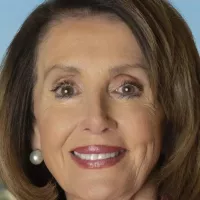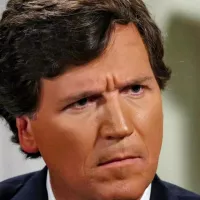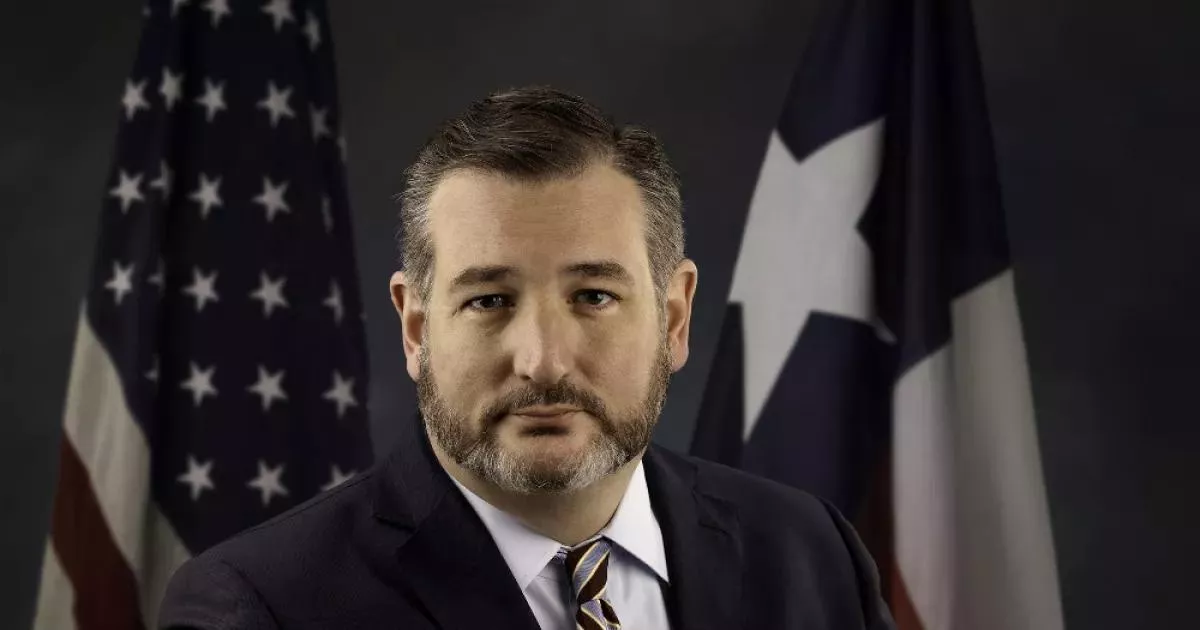Ted Cruz, born Rafael Edward Cruz, is an American politician and attorney currently serving as the junior United States Senator from Texas, a position he has held since 2013. As a prominent member of the Republican Party, Cruz previously served as the Solicitor General of Texas from 2003 to 2008. Since 2025, Cruz has chaired the Senate Commerce Committee, playing a key role in shaping legislation related to commerce and trade. He is a well-known figure in American politics and has been involved in numerous debates and policy discussions.
1954: Words "under God" legally a part of the Pledge
Since 1954, the words "under God" have been legally a part of the Pledge of Allegiance, part of the challenge to the constitutionality of public schools' requiring students to recite it in the Elk Grove Unified School District v. Newdow case in which Cruz was involved in 2004.
December 22, 1970: Ted Cruz Born
On December 22, 1970, Rafael Edward Cruz, now known as Ted Cruz, was born. He is currently a U.S. Senator for Texas.
1973: Father Earned Canadian Citizenship
In 1973, Rafael Cruz's father earned Canadian citizenship.
1979: Iran Hostage Crisis
In 1979, Hamid Aboutalebi was involved in the Iran hostage crisis, where American diplomats from the U.S. Embassy in Tehran were held captive.
1988: Graduated as Valedictorian
In 1988, Ted Cruz graduated as valedictorian from Second Baptist High School in Houston.
1992: Debating Achievements
In 1992, Ted Cruz won the top speaker award at both the U.S. National Debating Championship and the North American Debating Championship and was named U.S. National Speaker of the Year.
1995: Law Clerk for Judge J. Michael Luttig
From 1995 to 1996, Ted Cruz served as a law clerk for Judge J. Michael Luttig of the U.S. Court of Appeals for the Fourth Circuit.
1995: World Debating Championship Semifinal Loss
In 1995, Ted Cruz and his debate partner represented Harvard Law School at the World Debating Championship, losing in the semifinals to a team from Australia.
1995: Graduated from Harvard Law School
In 1995, Ted Cruz graduated from Harvard Law School with a Juris Doctor degree, magna cum laude.
1996: Law Clerk for Judge J. Michael Luttig
From 1995 to 1996, Ted Cruz served as a law clerk for Judge J. Michael Luttig of the U.S. Court of Appeals for the Fourth Circuit.
1996: Law Clerk for Chief Justice William Rehnquist
From 1996 to 1997, Ted Cruz served as a law clerk for Chief Justice William Rehnquist of the U.S. Supreme Court.
1997: Law Clerk for Chief Justice William Rehnquist
From 1996 to 1997, Ted Cruz served as a law clerk for Chief Justice William Rehnquist of the U.S. Supreme Court.
1997: Haley Arrested for Stealing Calculator
In 1997, Michael Wayne Haley was arrested for stealing a calculator from Walmart.
1997: Joined Cooper, Carvin & Rosenthal
In 1997, Ted Cruz joined the law firm Cooper, Carvin & Rosenthal as an associate.
1997: Parents' Divorce
In 1997, Ted Cruz's parents divorced.
1998: Involved in Boehner Litigation
In 1998, Ted Cruz was one of the attorneys representing Representative John Boehner during litigation against Representative Jim McDermott.
1999: Joined George W. Bush Campaign
In 1999, Ted Cruz joined the George W. Bush presidential campaign as a domestic policy advisor.
1999: Solicitor General Office Established
In 1999, The office of the solicitor general was established in Texas to handle appeals involving the Texas state government, which Ted Cruz later occupied.
2000: Assisted in Florida Recounts
During the 2000 Florida presidential recounts, Ted Cruz assisted in assembling the Bush legal team.
May 27, 2001: Cruz marries Heidi Nelson
On May 27, 2001, Ted Cruz married Heidi Nelson. They met while Cruz was working on George W. Bush's 2000 presidential campaign.
2001: Comparison of Vandalism to Destruction of Buddhas of Bamiyan
In 2022, Ted Cruz compared the vandalism and destruction of monuments and memorials in the United States to the 2001 destruction of the giant Buddhas of Bamiyan by the Taliban.
2003: Appointed Texas Solicitor General
In 2003, Greg Abbott, the Texas Attorney General, appointed Ted Cruz as Solicitor General.
2003: Defended Texas Redistricting Plan
In 2003, Ted Cruz served as lead counsel for the state and defended the multiple litigation challenges to the Texas congressional redistricting plan.
2003: Appointed Solicitor General of Texas
In 2003, Ted Cruz was appointed as the solicitor general of Texas.
2003: Texas Attorney General's Office Declined to Defend Sodomy Law
In 2003, while Ted Cruz was Texas Solicitor General, the Texas Attorney General's office declined to defend Texas's sodomy law in Lawrence v. Texas.
2004: Involved in Pledge of Allegiance Case
In 2004, Ted Cruz was involved in the Elk Grove Unified School District v. Newdow case, writing a brief on behalf of all 50 states.
2005: Father Became U.S. Citizen
In 2005, Rafael Cruz's father became a naturalized United States citizen.
2005: Trump Audio Recording Release
In October 2005, after the audio recording of Donald Trump was released, Ted Cruz reaffirmed his support, calling Democratic nominee Hillary Clinton "manifestly unfit to be president".
2008: Named Top Litigator by American Lawyer
In 2008, American Lawyer magazine recognized Ted Cruz as one of the 50 Best Litigators under 45 in America.
2008: End of term as Solicitor General
In 2008, Ted Cruz concluded his service as Solicitor General.
2008: Joined Morgan, Lewis & Bockius
In 2008, after leaving the Solicitor General position, Ted Cruz joined the Houston office of the law firm Morgan, Lewis & Bockius.
2010: Abandoned Attorney General Bid
In 2010, Ted Cruz abandoned his bid for state attorney general when Greg Abbott decided to run for reelection.
2010: Criticism of Affordable Care Act
In 2010, Ted Cruz was a vocal critic of the Patient Protection and Affordable Care Act passed under President Obama.
2010: Named One of the Greatest Texas Lawyers
In 2010, Texas Lawyer named Ted Cruz as one of the 25 Greatest Texas Lawyers of the Past Quarter Century.
January 19, 2011: Launched Senate Campaign
On January 19, 2011, after Kay Bailey Hutchison announced she would not seek reelection, Ted Cruz launched his campaign for U.S. Senate via a blogger conference call.
2011: Half-Sister's Death
In 2011, Miriam Ceferina Cruz, Ted Cruz's half-sister, passed away from a drug overdose.
July 2012: Senate Financial Disclosure
In July 2012, Ted Cruz disclosed loans from Goldman Sachs and Citibank on his Senate financial disclosure forms, which had not been disclosed on the FEC form.
2012: Cruz's intention on being the leading defender of Israel
In 2012, Ted Cruz ran for Senate in 2012 with the stated intention of being the leading defender of Israel in the United States Senate.
2012: Elected to the U.S. Senate
In 2012, Ted Cruz was elected to the U.S. Senate, marking him as the first Hispanic American U.S. Senator from Texas.
2012: Republican Primary Victory
In 2012, Ted Cruz, running as a Tea Party candidate, won the Republican primary.
2012: Ethics Violation Report
In 2012, Time magazine reported that Ted Cruz may have violated ethics rules by failing to disclose his financial relationship with Caribbean Equity Partners Investment Holdings during his campaign. Cruz stated the failure was inadvertent.
2012: Cruz Campaigning for Senate
In 2012, during his Senate campaign, Ted Cruz frequently mentioned his role as counsel for the State of Texas in Medellín v. Texas.
2012: Campaign Contributions from Oil, Gas and Coal Interests
Since 2012, Ted Cruz has received more than $2.5 million in campaign contributions from oil, gas and coal interests.
March 14, 2013: Cruz Keynote Speaker at CPAC
On March 14, 2013, Ted Cruz gave the keynote speech at the annual Conservative Political Action Conference (CPAC) in Washington DC.
March 2013: McCain's Criticism
In March 2013, John McCain called Ted Cruz and others "wacko birds" whose beliefs are not reflective of most Republicans.
October 2013: Cruz Wins Values Voter Summit Straw Poll
In October 2013, Ted Cruz won the Values Voter Summit presidential straw poll with 42% of the vote.
2013: Shutdown Denial
Despite his involvement, Ted Cruz consistently denied any involvement in the 2013 government shutdown, even though he voted to prolong it and was blamed by many for prompting it.
2013: Filibuster and Recognition
During his filibuster against the Affordable Care Act in 2013, Ted Cruz read "Green Eggs and Ham by Dr. Seuss". He was later named "Person of the Year" by Americans for Limited Government, and received other accolades from conservative publications.
2013: Cruz speaking events in early primary states
In 2013, Cruz did speaking events across Iowa, New Hampshire, and South Carolina, all early primary states.
2013: Government Shutdown Role
In 2013, Ted Cruz played a leading role in the United States federal government shutdown by giving a 21-hour Senate speech to defund the Affordable Care Act. He persuaded the House of Representatives to include an ACA defunding provision in the bill.
2013: Federal Government Shutdown Involvement
In 2013, Ted Cruz played a significant role in the federal government shutdown, attempting to defund the Affordable Care Act.
2013: Cruz Proposes Abolishing the IRS
In 2013, Ted Cruz proposed abolishing the IRS and implementing a flat tax system "where the average American can fill out taxes on a postcard".
2013: Statement on Same-Sex Marriage
In 2013, Ted Cruz stated he wanted marriage to be legally defined as only "between one man and one woman", but also that the legality of same-sex marriage should be left to each state to decide.
2013: Vote against federal aid for Hurricane Sandy recovery
In 2013, Ted Cruz voted against a bill providing federal aid to the Northern East Coast for recovery from Hurricane Sandy, citing unrelated spending within the bill.
2013: Cruz Voted Against Water Resources Development Act
In 2013, Ted Cruz voted against the Water Resources Development Act due to concerns about project backlogs and state participation, despite proponents' arguments that it would support research and restoration projects.
April 1, 2014: Visa Denial Bill
On April 1, 2014, Ted Cruz introduced S. 2195, a bill to allow the president to deny visas to UN ambassadors involved in espionage or terrorism, in response to Iran's choice of Hamid Aboutalebi as ambassador.
April 12, 2014: Cruz Speaks at Freedom Summit
On April 12, 2014, Ted Cruz spoke at the Freedom Summit, suggesting that the Republican Party should reach out to Latinos, young people, and single mothers, and that the words "growth and opportunity" should be tattooed on every Republican politician's hands.
April 18, 2014: Bipartisan Message to Iran
On April 18, 2014, Ted Cruz thanked President Barack Obama in a Politico article for signing S. 2195 into law, acknowledging unanimous Congressional support.
May 14, 2014: Cruz formally renounced his Canadian citizenship
On May 14, 2014, Ted Cruz formally renounced his Canadian citizenship.
November 2014: Senate Speech Controversy
In a November 2014 Senate speech, Ted Cruz accused President Obama of wanting to "destroy the Constitution" and likened him to Catiline, a Roman senator, drawing criticism for the dangerous rhetoric.
December 2014: Cruz Criticizes Cuban Thaw
In December 2014, Ted Cruz criticized the Obama administration's Cuban thaw on Fox News, calling it a "manifestation of the failures of the Obama-Clinton-Kerry foreign policy" and predicting it "will be remembered as a tragic mistake".
2014: Cruz finishes first in two presidential straw polls
In 2014, Cruz finished first in two presidential straw polls, securing 30.33% of the vote at the Republican Leadership Conference and 43% of the vote at the Republican Party of Texas state convention.
2014: Cruz's passion for Israel
In 2014, Ted Cruz told the Zionist Organization of America, "standing for Israel is a deep passion of mine".
2014: Hard-Line Stance on Immigration Issues
In 2014, Ted Cruz took a "hard-line stance" on immigration issues during the border crisis and opposed comprehensive immigration reform.
2014: Cruz Advocates Auditing the Federal Reserve System
In a 2014 opinion editorial in USA Today, Ted Cruz stated that auditing the Federal Reserve System was a top Republican priority in 2015.
January 2015: Cruz Delivers State of the Union Response
In January 2015, Ted Cruz delivered one of the many State of the Union responses.
March 2015: Cruz Rejects Climate Change Consensus
In March 2015, Ted Cruz rejected the scientific consensus on climate change, stating that some people are "global warming alarmists" and claiming, contrary to NASA's analysis, that there had been no significant warming in 18 years.
March 23, 2015: Cruz Launches 2016 Presidential Campaign
On March 23, 2015, Ted Cruz officially launched his 2016 presidential campaign at Liberty University, becoming the first major Republican presidential candidate for the 2016 campaign.
June 2015: Few Allies
In June 2015, Ted Cruz expressed pride in his reputation for having few allies in the Senate, stating that he has been vilified for fighting "the Washington cartel".
June 30, 2015: Publication of 'A Time for Truth'
On June 30, 2015, HarperCollins published Ted Cruz's book, "A Time for Truth: Reigniting the Promise of America," which became a bestseller.
July 2015: Clash with Mitch McConnell
In July 2015, Ted Cruz accused Senate Republican Leader Mitch McConnell of lying about his intentions to reauthorize the Export-Import Bank of the United States, leading to condemnation from Republican senators.
August 2015: Cruz Criticizes Obama Administration's Stance on Law Enforcement
In August 2015, following the death of a Texas police officer, Ted Cruz criticized the Obama administration for allegedly vilifying law enforcement and endangering public safety through their responses to events in Ferguson and Baltimore.
September 2015: Cruz expresses concern over Boehner's resignation
In September 2015, Ted Cruz voiced his concern that John Boehner might have made a deal with Nancy Pelosi to fund the Obama administration before his resignation.
2015: Committee Attendance and Voting Record
During his first two years in the Senate, and through the first three months of 2015, Ted Cruz had mixed attendance records at Armed Services, Commerce, and Judiciary Committee hearings, and missed 21 of 135 roll call votes.
2015: Iran Nuclear Agreement Criticism
In 2015, Ted Cruz criticized the international nuclear agreement with Iran, stating it would make the Obama administration the world's leading financier of radical Islamic terrorism, leading to criticism from Obama and Mitt Romney.
2015: Support for Federal Aid in Texas Flooding
In 2015, Ted Cruz supported federal aid funding following severe flooding in Texas.
2015: Cruz Votes for USA Freedom Act
In 2015, Ted Cruz voted for the USA Freedom Act, which reauthorized the USA Patriot Act but reformed some of its provisions.
2015: Cruz Opposes Iran Nuclear Deal
In 2015, Ted Cruz was an adamant opponent of the Joint Comprehensive Plan of Action, the international nuclear agreement with Iran, labeling it "catastrophic" and "disastrous".
2015: Cruz Advocates Auditing the Federal Reserve System
In 2015, Ted Cruz wrote that auditing the Federal Reserve System was a top Republican priority.
2015: Response to Supreme Court Decision on Same-Sex Marriage
In 2015, after the Supreme Court's Obergefell decision legalizing same-sex marriage, Ted Cruz called the decision "the very definition of tyranny" and accused the court of judicial activism.
January 2016: Undisclosed Loans
In January 2016, The New York Times reported that Ted Cruz and his wife failed to report nearly $1 million in low-interest loans from Goldman Sachs and Citibank on Federal Election Commission disclosure statements. The loans were later repaid with campaign fundraising.
February 1, 2016: Cruz Wins Iowa Caucuses
On February 1, 2016, Ted Cruz won the Iowa caucuses with 28% of the vote, becoming the first Hispanic to win either a presidential primary election or caucus.
February 2016: Illinois Board of Elections ruled in Cruz's favor
In February 2016, the Illinois Board of Elections ruled in Cruz's favor, stating, "The candidate is a natural born citizen by virtue of being born in Canada to his mother who was a U.S. citizen at the time of his birth."
March 1, 2016: Cruz Wins Multiple States on Super Tuesday
On March 1, 2016, Super Tuesday, Ted Cruz won Texas by 17%, along with Alaska and Oklahoma, securing a total of four state primary victories.
March 8, 2016: Cruz Wins Idaho Primary
On March 8, 2016, Ted Cruz won the Idaho primary with 45% of the vote, defeating Donald Trump by 17% and earning his seventh statewide victory.
March 2016: Argument Against Considering Obama's Supreme Court Nominee
In March 2016, Ted Cruz argued that the Senate should not consider Obama's Supreme Court nominee, suggesting the decision should be made after the upcoming presidential election.
April 6, 2016: Cruz Wins Wisconsin Primary
On April 6, 2016, Ted Cruz won the Wisconsin primary with 48.2% of the vote, securing his tenth statewide win.
May 3, 2016: Cruz on Trump
On May 3, 2016, after several contentious personal exchanges, Ted Cruz spoke about Trump.
June 2016: Orlando Nightclub Shooting Blame
In June 2016, Ted Cruz blamed the Obama administration for the Orlando nightclub shooting, arguing they failed to properly track the perpetrator, Omar Mateen, while he was on the terrorist watch-list.
September 2016: Cruz Backs Obama Administration's Arms Sale to Saudi Arabia
In September 2016, Ted Cruz backed the Obama administration's plan to sell more than $1.15 billion worth of weapons to Saudi Arabia.
September 23, 2016: Cruz Endorses Trump for President
On September 23, 2016, Ted Cruz publicly endorsed Donald Trump for president after previously withholding his endorsement at the Republican National Convention.
2016: Hard-Right Immigration Stances During Presidential Campaign
According to McClatchy, in 2016 during his presidential campaign, Ted Cruz staked out "hard-right immigration stances".
2016: Cruz widely expected to run for president in 2016.
As early as 2013, Cruz was widely expected to run for the presidency in 2016.
2016: Denunciation of Outsourcing American Jobs
During his 2016 presidential campaign, Ted Cruz strongly denounced outsourcing American jobs to other countries, blaming politicians and President Obama for allowing it.
2016: Presidential Campaign Criticism
During the 2016 presidential campaign, Ted Cruz was a vocal critic of Donald Trump, with both exchanging heated comments directed at each other and Cruz's family.
2016: Cruz's support during the primary campaign.
During the 2016 primary campaign, Cruz's base of support was mainly among social conservatives, though he had crossover appeal to other factions within his party, including in particular libertarian conservatives.
2016: Cruz's 2016 bid
In 2013, Cruz's speaking events across Iowa, New Hampshire, and South Carolina, all early primary states, leading to further speculation that he was laying the groundwork for a 2016 bid.
2016: Chad Sweet denounced Cruz for assault on democracy
In 2016, Chad Sweet, the chair of Cruz's 2016 presidential campaign, denounced Cruz for "assault on our democracy".
2016: Cruz Confirmed to Speak at Republican National Convention
In 2016, Ted Cruz confirmed that he would speak at the 2016 Republican National Convention after a meeting with Donald Trump.
2016: Sought Republican Presidential Nomination
In 2016, Ted Cruz pursued the Republican presidential nomination, competing with Donald Trump.
2016: Cruz's 2016 Republican presidential primaries
In the 2016 Republican presidential primaries, Cruz received over 7.8 million votes, won 12 states, and earned 559 delegates.
January 5, 2017: Cruz Votes to Condemn UN Resolution on Israeli Settlements
On January 5, 2017, Ted Cruz voted in favor of a House resolution condemning UN Security Council Resolution 2334, which criticized Israeli settlement building in occupied Palestinian territories.
January 2017: Cruz Meets with Taiwanese President
In early January 2017, Ted Cruz met with Taiwanese President Tsai Ing-wen, leading to criticism of the People's Republic of China.
January 2017: Praise for Neil Gorsuch
In late January 2017, Ted Cruz praised Supreme Court nominee Neil Gorsuch as "brilliant and immensely talented" in a written statement, marking a shift towards becoming an important Trump ally.
March 2017: Debt ceiling lifted through March 2017
In March 2017, the debt ceiling was lifted through March 2017 as part of a budget agreement passed in the House with unanimous support from Democrats and Boehner. Cruz called the agreement "complete and utter surrender".
December 2017: Mocking of Net Neutrality Supporters
In December 2017, Ted Cruz mocked supporters of net neutrality as "snowflakes" after the Republican-controlled FCC repealed net neutrality regulations.
2017: Call for Federal Intervention During Hurricane Harvey
In 2017, Ted Cruz called for federal intervention as Hurricane Harvey approached the coast of Texas.
2017: Endorsement of Roy Moore
In 2017, Ted Cruz endorsed Roy Moore for U.S. Senate the same day that an audio clip resurfaced of Moore calling Obergefell "worse" than the 1857 ruling that upheld slavery.
2017: Cruz Urges Trump to Withdraw from Paris Agreement
In 2017, Ted Cruz was among 22 senators who signed a letter urging President Trump to withdraw from the Paris Agreement.
2017: Sponsorship of legislation to repeal the Health Care and Education Reconciliation Act
In 2017, during Trump's presidency, Cruz sponsored legislation to repeal the Health Care and Education Reconciliation Act of 2010, and was involved in drafting the unsuccessful AHCA proposals.
February 2018: Opposition to Motion on DREAMers Legislation
In February 2018, Ted Cruz was the sole senator to oppose a Republican motion to begin debate on legislation intended to resolve the issue of DREAMers.
March 6, 2018: Primary Election Win
On March 6, 2018, Ted Cruz won the Republican nomination in the primary election for his second term, receiving over 80% of the vote.
April 2018: Cruz on Trump in Time 100
In April 2018, Ted Cruz wrote the copy accompanying Donald Trump's entry on the Time 100 most influential people of 2017, stating, "President Trump is doing what he was elected to do: disrupt the status quo."
July 2018: Cruz Speaks at Rally for Religious Freedom in Asia
In July 2018, Ted Cruz spoke at the Rally for Religious Freedom in Asia, expressing solidarity with those persecuted by communists and emphasizing the importance of standing united for freedom.
August 2018: Cruz Calls for Sanctions Against Chinese Officials
In August 2018, Ted Cruz and other lawmakers urged the Trump administration to impose sanctions under the Global Magnitsky Act against Chinese officials responsible for human rights abuses against Uyghur Muslims in Xinjiang.
November 6, 2018: Re-election Victory
On November 6, 2018, Ted Cruz won re-election to the Senate, defeating Beto O'Rourke by a slim margin of 50.9% to 48.3%.
November 2018: Sponsored Bills
As of November 2018, Ted Cruz had sponsored 105 bills.
2018: Net Worth
As of 2018, according to OpenSecrets, Ted Cruz's net worth was more than $3.1 million.
2018: Loan to Campaign
In 2018, Ted Cruz loaned $10,000 to his campaign, which was over the limit of $250,000 for personal loans that can be repaid with money raised after an election.
2018: Re-elected to U.S. Senate
In 2018, Ted Cruz was re-elected to the U.S. Senate in a closely contested race.
December 2019: Cruz Warns Allseas on Nord Stream II Pipeline
In December 2019, Ted Cruz and Senator Ron Johnson warned Allseas of sanctions if it did not suspend work on the Nord Stream II pipeline.
2019: Co-sponsorship of Armenian Genocide Resolution
In 2019, Ted Cruz co-sponsored a resolution to commemorate the Armenian genocide, stating that alliances based on lies are unsustainable.
January 21, 2020: Launch of Verdict with Ted Cruz Podcast
On January 21, 2020, Ted Cruz and Michael J. Knowles launched the podcast, Verdict with Ted Cruz. The initial episodes focused on summarizing the impeachment hearings of Donald Trump.
July 13, 2020: China Sanctions Cruz for Xinjiang Criticism
On July 13, 2020, the Chinese government sanctioned Ted Cruz and three other U.S. politicians for "interfering in China's internal affairs" by condemning human rights abuses in Xinjiang.
August 10, 2020: China Sanctions Cruz over Hong Kong
On August 10, 2020, the Chinese government sanctioned Ted Cruz and 10 other Americans for "behaving badly on Hong Kong-related issues".
September 2020: Cruz Shortlisted for Supreme Court
In September 2020, Donald Trump included Ted Cruz on a shortlist for possible appointment to the Supreme Court, alongside Senators Tom Cotton and Josh Hawley; however, Cruz declined the consideration.
September 2020: Support for immediate vote on Trump's Supreme Court Nominee
In September 2020, less than two months before the next presidential election, Cruz supported an immediate vote on Trump's nominee to fill the Supreme Court vacancy caused by Justice Ruth Bader Ginsburg's death.
December 2020: Russian Ship Continues Nord Stream II Pipelaying
In December 2020, the Russian pipelaying ship Akademik Cherskiy continued pipelaying on the Nord Stream II pipeline.
2020: Claims about the 2020 presidential election
In 2020, Cruz was accused of misleading people for political gain with inaccurate statements about fraud in the election.
2020: Cruz Backs Failed Appeal to Overturn 2020 Election
In 2020, Ted Cruz backed a failed appeal to the U.S. Supreme Court attempting to overturn the 2020 presidential election in Pennsylvania and later led an effort to refuse to count Pennsylvania's Electoral College votes, citing baseless allegations of fraud.
2020: Cruz Supports Lawsuit to Nullify Election Results
In 2020, as part of attempts to overturn the 2020 presidential election, Ted Cruz supported a lawsuit seeking to nullify election results in four states and garnered support for a plan to delay the January 6 electoral vote certification.
2020: Expensive Election
In 2020, the election between Kelly Loeffler and Raphael Warnock surpassed Cruz and O'Rourke's race as the most expensive U.S. Senate election in history.
2020: 2020 Presidential Election
In 2020, the presidential election occurred that Cruz later objected to the certification of Joe Biden's victory in 2021.
January 6, 2021: Cruz on Arizona's electoral votes
On January 6, 2021, during the debate about whether Congress should accept Arizona's electoral votes, Cruz stated that 39% of Americans believed the 2020 presidential election was rigged, while claiming he wasn't arguing to overturn the election results.
May 2021: False Assertions About For The People Act
During a May 2021 Senate Rules Committee hearing, Ted Cruz falsely claimed that House Democrats designed the For The People Act to encourage illegal voting, despite the bill stating only U.S. citizens could register.
May 28, 2021: Cruz Votes Against Riot Investigation Commission
On May 28, 2021, Ted Cruz voted against creating an independent commission to investigate the January 6th riot at the Capitol.
June 4, 2021: First Line of Nord Stream II Pipeline Completed
On June 4, 2021, Putin announced that pipelaying for the first line of the Nord Stream II was fully completed.
September 2021: Second Line of Nord Stream II Pipeline Completed
In September 2021, the second line of the Nord Stream II pipeline was completed.
October 2021: Criticism of Australia's Vaccine Mandates
In October 2021, Ted Cruz criticized Australia's Northern Territory's vaccine mandates in a tweet, which prompted a viral response from Chief Minister Michael Gunner.
2021: Objected to Certification of 2020 Election
In 2021, Ted Cruz objected to the certification of Joe Biden's victory in the 2020 presidential election.
May 2022: Cruz's Response to Robb Elementary School Shooting
In May 2022, after the Robb Elementary School shooting, Ted Cruz attributed mass shootings to various societal factors, including declining church attendance and violent video games. Cruz voted against the Bipartisan Safer Communities Act.
May 2022: Supreme Court Sides with Cruz
In May 2022, the Supreme Court sided with Ted Cruz in FEC v. Ted Cruz for Senate, allowing him to ask donors to help repay $555,000 he loaned to his campaigns, including money from his 2012 and 2018 campaigns.
July 2022: Support for Repeal of Texas Anti-Sodomy Law
In July 2022, Ted Cruz issued a press release supporting the repeal of the 1845 Texas anti-sodomy law, stating that consenting adults should have freedom in their private sexual activity.
October 2022: Partnership with iHeartRadio
In October 2022, Verdict with Ted Cruz partnered with iHeartRadio and expanded to three times a week with Ben Ferguson as co-host.
2022: Pronoun Joke at Turning Point USA Summit
In 2022, Ted Cruz reaffirmed his position on Obergefell after comments by Justice Clarence Thomas and joked at a Turning Point USA summit that his favored personal pronoun is "kiss my ass".
2022: Cruz Criticizes China Over Detention of Mark Swidan
In 2022, Ted Cruz sharply criticized the Chinese government for its detention of Houston resident Mark Swidan, who had been held for over ten years.
2022: Vote Against Semiconductor Manufacturers Funding Bill Amendment
In 2022, Ted Cruz voted against Bernie Sanders's proposed measure for the United States Innovation and Competition Act, which would block semiconductor manufacturers funded by the bill from outsourcing jobs and dissuading union formation.
2022: Cruz Voted Against the Inflation Reduction Act
In 2022, Ted Cruz voted against the Inflation Reduction Act.
2022: Vote Against Respect for Marriage Act
In 2022, Ted Cruz voted against the Respect for Marriage Act.
March 2023: Vote Against Repealing AUMF in Iraq
In March 2023, Ted Cruz voted against repealing the Authorization for Use of Military Force (AUMF) in Iraq.
2023: Cameo in Lady Ballers
In 2023, Ted Cruz had a cameo in The Daily Wire comedy film Lady Ballers.
2023: Cruz Votes Against Fiscal Responsibility Act
In 2023, Ted Cruz was among the 31 Senate Republicans who voted against the final passage of the Fiscal Responsibility Act.
September 2024: Tweeting Racist Image Macro
In September 2024, Ted Cruz tweeted an image macro perpetuating a false claim by Donald Trump about Haitian immigrants, drawing condemnation and raising questions about his concern for American pets.
2024: Trump Endorsement
In 2024, Ted Cruz endorsed Donald Trump for the Republican nomination in the upcoming presidential election.
2024: Re-elected to U.S. Senate
In 2024, Ted Cruz was re-elected to the U.S. Senate.
January 2025: Introduction of Kids Off Social Media Act (KOSMA)
In January 2025, Ted Cruz, along with other senators, introduced the Kids Off Social Media Act (KOSMA), which would set a minimum age of 13 for social media use and restrict targeted content for users under 17.
May 2025: Introduced Bill to Create Trump Accounts
In May 2025, Ted Cruz introduced a bill to create what later became Trump Accounts.
June 2025: Cruz Introduces Amendment on AI Regulation
In June 2025, Ted Cruz, representing the tech industry, proposed an amendment to the One Big Beautiful Bill Act to impose a ten-year moratorium on state and federal AI regulation attempts. However, it was overwhelmingly defeated with a vote of 99-1.
June 2025: Cruz on Iran-Israel War
In June 2025, during the Iran–Israel war, Ted Cruz advocated for regime change in Iran during a Fox News interview and discussed supporting Israel's attacks on Iran, while also clashing with Tucker Carlson over his knowledge of Iran and stance on Israel.
July 2025: Cruz Vacationing in Greece During Central Texas Floods
In July 2025, during the Central Texas floods, Ted Cruz was on vacation in Greece. He visited the Parthenon in Athens the day after a flash flood along the Guadalupe River in central Texas killed more than 100 people. Cruz's office said he returned to Texas "as fast as humanly possible" after the flooding began.
October 2025: Cruz Warns of Resurgent Antisemitism
In October 2025, Ted Cruz criticized growing antisemitism on the right and warned of a resurgence of replacement theology underpinning anti-Jewish and anti-Israel sentiment.
October 2025: Objection to the Protecting Americans from Doxing and Political Violence Act
In October 2025, Ted Cruz was the only senator who objected to the Protecting Americans from Doxing and Political Violence Act, which aimed to extend data protections to all Americans.
December 2025: Cruz Receives Funding from Pro-Israel Lobby Groups
As of December 2025, Ted Cruz had received $1,872,592 from pro-Israel lobby groups.
2025: Cruz on Defending Israel
In 2025, Ted Cruz stated that he first ran for Senate in 2012 with the intention of being the leading defender of Israel in the United States Senate.
2025: Premiere on Conservative Talk Radio Stations
In 2025, iHeartMedia introduced Verdict with Ted Cruz onto its conservative talk radio stations via Premiere Networks, making Cruz the first sitting U.S. senator to host a national radio show.
2025: Chaired Senate Commerce Committee
Since 2025, Ted Cruz has chaired the Senate Commerce Committee.
Mentioned in this timeline

Donald John Trump is an American politician media personality and...

Bernie Sanders is a prominent American politician currently serving as...

Nancy Pelosi is a prominent American politician notably serving as...

Tucker Carlson is an American right-wing political activist and commentator...

Barack Obama the th U S President - was the...

Hillary Diane Rodham Clinton is a prominent American politician lawyer...
Trending
60 minutes ago White House briefing addresses Iran war concerns, potential US strikes, and war powers.

2 hours ago Tyler Myers traded to Dallas Stars from Vancouver Canucks for draft picks.

2 hours ago Los Angeles attractions, US-Iran conflict, and hacked cameras make headlines.

2 hours ago Harry Styles' new album reviewed, and London pop-up shop announced with exclusive merch.

2 hours ago Yvette Nicole Brown's caregiving choice and Zootopia 2 coming soon to Disney+.
3 hours ago Rumors Swirl: Rams Eye Trade for Chiefs' Star Trent McDuffie
Popular

Ken Paxton is an American politician and lawyer serving as...

Hillary Diane Rodham Clinton is a prominent American politician lawyer...

Jesse Jackson is an American civil rights activist politician and...

Jim Carrey is a Canadian-American actor and comedian celebrated for...

Bill Clinton served as the nd U S President from...

XXXTentacion born Jahseh Dwayne Ricardo Onfroy was a controversial yet...


